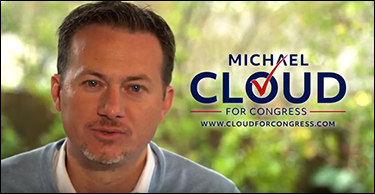By Jim Ellis

Michael Cloud (R) | Photo from campaign ad
Former Rep. Blake Farenthold (R-Corpus Christi) is one of several members to be forced from office because of sexual harassment allegations. Already announcing that he would not seek re-election because of a settlement reached with a female employee that was financed through the special congressional taxpayer funded account created years ago to settle internal employee relations incidents, Farenthold then quickly resigned from Congress when it became apparent that the House Ethics Committee was going to fully investigate his situation.
Rep. Farenthold’s exit meant the committee would no longer have jurisdiction to consider an ethics complaint because the incumbent’s mid-term departure meant the committee could not pursue a private citizen.
Under Texas election law, Gov. Greg Abbott (R) was forced to quickly call a special election to fill the balance of the term. His state’s vacancy procedure did not afford him the opportunity of making the special election concurrent with the regular vote as Govs. Rick Snyder (R-MI) and Andrew Cuomo (D-NY) did when House members in their states resigned (Rep. John Conyers, D-MI) or suddenly passed away (Rep. Louise Slaughter, D-NY).
The original election, in jungle primary format as all Texas special elections require, was set for this past weekend, on Saturday, June 30. The March 6 regular Republican primary advanced former Water Development Commission chairman Bech Bruun and ex-Victoria County Republican Party chairman and public relations company owner Michael Cloud, on a 36-34 percent vote, into a GOP run-off contest. The May 22 secondary vote went Cloud’s way, as he clinched the Republican nomination in landslide proportion, 61-39 percent. For the Democrats, former congressional aide Eric Holguin defeated 2016 nominee Roy Barrera, 62-38 percent.
With this backdrop, a total of nine major party, minor party, and Independent candidates went to Saturday’s ballot, with the winner heading immediately to Washington to serve the balance of the current term. Though Gov. Abbott scheduled the election for June 30, he did not set a timetable for an associated run-off election in case no candidate garnered majority support.
It turns out the governor will not need to schedule anything further. Because of the district’s Republican voting nature and that Michael Cloud won the regular GOP nomination, he was a heavy favorite going into the special election. This became even clearer when Bruun, who soundly lost the run-off to Cloud, decided not to compete in the special election and endorsed the man who defeated him. Bruun’s name, however, remained on the ballot.
On Saturday, Michael Cloud captured 54 percent of the vote, and will be sworn into office once the Texas Secretary of State officially certifies the election totals. The second-place finisher was Holguin, who attracted 32 percent support. The election was not heavily contested, as the candidates, especially Cloud and Holguin, were marshaling their resources for the regular election. Still, a strong Cloud victory, such as the one he scored on Saturday, not only will make him the new congressman, but it also gives him an even greater advantage heading into the November election.
Filling the Texas seat means there are now 63 open seats heading into the fall election; 41 in currently held Republican districts and 21 in Democratic CDs, with one new seat that Pennsylvania redistricting created (PA-14).
